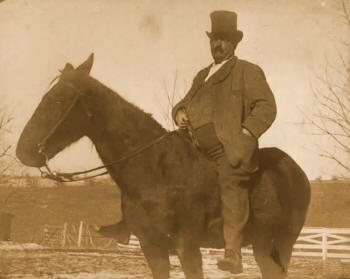Dr. John J. Ensor (1826-1909)
|
U. S. Army Hospital Department surgery set owned by Dr. Ensor Dr. J. J. Ensor was born near Johnson City, Tenn., May 28, 1829. Dr. Ensor was a pioneer of both Washington and Carter Counties, and died in Bristol, at the age of eighty-nine years. The youngest of four children, he was educated at Washington College, and began the study of medicine in 1846 under Dr. A. Jobe, of Elizabethton. He began practice in 1848, at Jonesboro, and the following year removed to Blountville. Since 1870 he had a large practice at Bristol. During the Civil War he is believed to have been a surgeon with the First Confederate Tennessee Brigade. But this information has not been verified as yet. (As of May, 2010)
February 12, 1852, he married Amanda, the daughter of William and
Jane (Rutledge) Anderson, and born in this county in 1831. Her
grandfather was the famous Gen. George Rutledge, of King’s Mountain.
Their children are Hannah E. (now Mrs. M. Thomas), George M. and
William T. The late Dr. Ensor attended the public schools of his native county, and was graduated from Washington College. He took up the study of medicine in 1846, reading under Dr. A. Jobe at Elizabethton, and in 1848 opened an office and began practice at Jonesboro. Jonesboro was the center of a radiating country practice until 1849, when he moved to Blountville. He reached a high place in his profession, at Blountville, and when the war broke out his services were called into the Confederate cause as brigadier surgeon for the First Tennessee Brigade. Some years after the war in 1870, seeking a larger field for his professional services, Dr. Ensor located at Bristol, and continued to practice there until his death. During his career at Bristol he became recognized as one of the leading physicians and surgeons of eastern Tennessee, and his practice was exceedingly large, and he was often called into consultation by his fellow members of the profession, and was almost continuously active until his last days. He was well known in eastern Tennessee for his uprightness and his friends were everywhere in proportion as he had made acquaintance either through his profession or as man to man. In 1871 Dr. Ensor performed surgery on former president Andrew Johnson. Dr. Henry Quincy Adams came to Bristol, Tenn. from Wytheville, Va. in 1873 to open the first civilian hospital.
HISTORIC SULLIVAN A History of Sullivan County, Tennessee with brief Biographies of the Makers of History BY OLIVER TAYLOR BRISTOL, TENN. THE KING PRINTING CO. {Le Rot Press) 1909 BATTLE OF BLOUNTVILLE.
The battle began at noon and lasted until four o'clock in the afternoon. 9 The Confederate forces numbered twelve hundred and fifty-seven, while there were double that number on the Federal side. Capt. Davidson's battery, that participated in this fight, had distinguished itself in the battle of Manassas. As an example of marksmanship for which the American soldier is renowned — Capt. Davidson was told that Federal sharpshooters were in the belfry of the Metho- dist church and he decided to fire upon it. He was asked not to hit the bell and its location was pointed out to him ; he then sent one ball just above and one just below the bell although the church was a quarter of a mile away. Dr. J. J. Ensor, who acted as surgeon, timed the battle from the firing of the first gun. At Hamilton's hill Jones reinforced Carter and another stand was made. The Federals were driven back, retiring to Blountville, but later retreated further. The returning citizens of the town found that what homes were left had been looted and what was not taken had been destroyed. There was nothing to eat and the women were com- pelled to beg meal from the soldiers. The casualties were not great on either side — the Con- federates losing only three dead and eight or ten wounded, while the Federals had twelve killed and as many more wounded. The Institute and Methodist church were used as temporary hospitals and Dr. J. J. Ensor and Dr. Nat Dulaney, Sr., aided the Federal surgeons with the wounded. The casualties were not great on either side — the Con- federates losing only three dead and eight or ten wounded, while the Federals had twelve killed and as many more wounded. The Institute and Methodist church were used as temporary hospitals and Dr. J. J. Ensor and Dr. Nat Dulaney, Sr., aided the Federal surgeons with the wounded. 12 Dr. Ensor related the following: Among the wounded on the Federal side was an Irishman, who wanted to be relieved from service. Receiving a flesh wound on the head he feigned unconsciousness and was placed in the temporary hospital. When the surgeon went to examine him he was moaning in an delirious manner, "send for a praste ( bring me a cand'l; send for a praste, bring me a cand'l." The surgeon, not wishing to operate on him in that condition, passed him by for the time, remarking, "the poor fellow is in a bad way." The wounded soldier confided to Dr. Ensor his desire to quit the army and the doctor told him he would not interfere with his plans. The next day the patient was at breakfast with the Ensor family when a servan t entered and said the Federal surgeon was coming. The Irishman on learning this jumped up from the table and broke through a window to get back in the hospital. When the surgeon made his rounds he found his patient stretched out, apparently weaker than the day before and still faintly and incoherently calling, "send for a praste, bring me a cand'l." The surgeon passed him by. The man, sure of being put on the dead-list, left for parts unknown.
From Dr. Terry Hambrecht (June, 2010), who is doing extensive research on Civil War Confederate surgeons:
|
